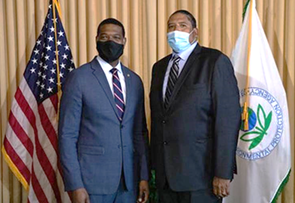EPA Administrator Regan and National Tribal Caucus Chair Wagner Co-Chair 2021 National Tribal Operations Committee Meeting
WASHINGTON (Sept. 30, 2021) – Today, the U.S. Environmental Protection Agency (EPA) hosted the annual National Tribal Operations Committee (NTOC) meeting. EPA Administrator Michael Regan co-chaired the meeting with National Tribal Caucus (NTC) Chair Gerald Wagner of the Blackfeet Nation. Members of the NTOC include the EPA Administrator, senior leaders across EPA, and Tribal representatives from across Indian Country. EPA established the NTOC in 1994 to ensure that EPA leadership and Tribal Nation representatives engage in dialogue that provides advice to EPA on Tribal environmental issues that are national in scope, cross-agency or cross-media in nature, or that may be emerging or urgent.
“EPA is committed to working collaboratively with Tribal Nations to protect human health and the environment in Indian Country, and the NTOC is an important tool in our Nation-to-Nation partnership,” said EPA Administrator Michael S. Regan. “We know that our work is strongest – and most effective – when it’s informed by people’s lived experiences. I was honored to join Chair Wagner today to affirm our commitment to listen and engage with Tribal governments and support Tribal authority.”

The meeting was highlighted by Administrator Regan’s reaffirmation of the EPA Policy for the Administration of Environmental Programs on Indian Reservations (1984 Indian Policy). The 1984 Indian Policy has committed EPA to consider Tribal interests in carrying out its programs. The Policy contains principles that include recognizing Tribes as the appropriate entities to set standards, make environmental policy decisions, and manage programs for reservations. The 1984 Indian Policy remains the cornerstone for EPA’s Tribal program to this day. Administrator Regan’s affirmation of this important policy signifies the continued federal position in support of Tribal self-government and government to government relations. The 1984 Indian Policy has been consistently reaffirmed by EPA Administrators since 1984.
At today’s NTOC, Administrator Regan shared some of the Agency’s priorities which include EPA’s commitment to strengthen EPA’s consultation and coordination process with Tribes; participation in the White House Council on Native American Affairs with a focus on climate change, Tribal homelands, and treaties; and EPA’s commitment to support Tribal authority to manage environmental programs within their reservations.
Additionally, the Administrator discussed EPA’s work to carry out the Justice 40 initiative to deliver 40 percent of the benefits from federal investments to underserved communities, and EPA’s essential role in closing the health disparity gap through the American Rescue Plan. The “ARP” earmarks $100 million for EPA to advance environmental justice and improve air quality for state and Tribal communities. There was also a robust discussion on the newly released EPA climate adaptation plan and cross-media impacts of climate change on food sovereignty, water resources, air quality and drought impacts. The meeting concluded with a robust discussion on opportunities for flexibilities in EPA and Tribal environmental program implementation efforts, where example approaches for advancing Tribal and EPA partnerships were discussed.
Background on EPA’s Tribal Programs
To accelerate progress under the 1984 Indian Policy, in 1994, the modern structure of the EPA Tribal Program was developed, including the creation of EPA’s American Indian Environmental Office (AIEO) to lead efforts across the agency to protect human health and the environment in Indian country, with a special emphasis on helping Tribes administer their own environmental programs. AIEO achieves its purpose by supporting implementation of federal environmental laws in Indian country consistent with the 1984 EPA Indian Policy.
For more information about the EPA’s programs in Indian Country, visit: https://www.epa.gov/tribal.
